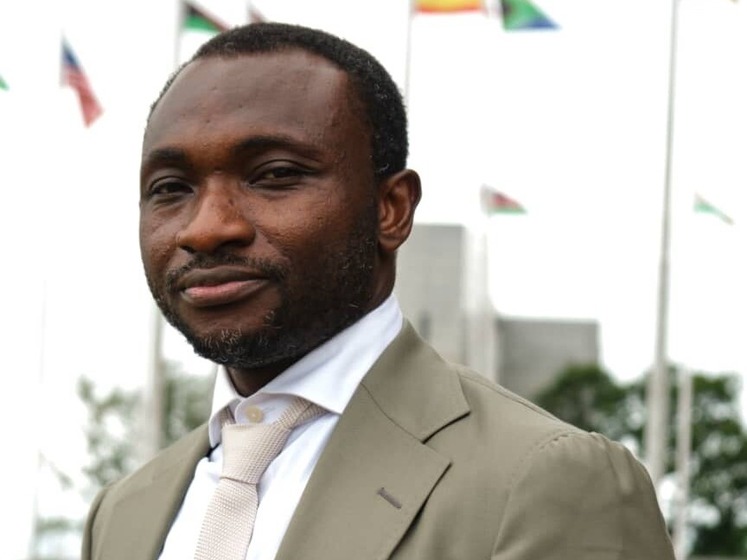 Tell us about your journey since graduating from LSE
Tell us about your journey since graduating from LSE
Since receiving my doctorate from LSE in 2021, my path has been one defined by continual learning, active leadership, and impactful contributions towards the development of my homeland, Sierra Leone. I moved back to Sierra Leone upon graduation, where I was hired as an Advisor to the Minister of Agriculture and Food Security by the Tony Blair Institute.
My tenure with the Tony Blair Institute provided me with an invaluable opportunity to directly apply my academic understanding towards real-world policy-making, thereby impacting the socioeconomic landscape of Sierra Leone. My role eventually grew to encompass a wider influence as the Chief Technical Advisor in the Office of the President, a position that allowed me to shape and guide national policies at the highest level.
In 2023, I was appointed by the President of Sierra Leone as the Honorable Minister of Agriculture and Food Security. This recognition was a significant moment in my journey, providing me with an even more pronounced platform to contribute to the wellbeing of my people.
You have recently been appointed Minister of Agriculture and Food Security for Sierra Leone. What are your key priorities and challenges in your new role?
Sierra Leone is contending with substantial food insecurity and a struggling economy. Furthermore, climate change continues to negatively affect agriculture productivity. Agriculture constitutes approximately 56% of our nation's GDP, and over 65% of population find their livelihood from the sector. We are grappling with high rates of unemployment, especially among the youth and in rural areas. A large percentage of our farming families remain poor.
My objective as Minister is to design and implement an agriculture strategy that effectively addresses these issues. This includes the development of sustainable solutions to our food security challenges, reducing our reliance on food importation, providing comprehensive support for farmers to enhance their profitability, creating employment opportunities for youths and women, and utilising agriculture as a bedrock to bolster our economy and instill resilience against various shocks.
However, achieving these goals is not without its challenges. Our fiscal resources are limited, even though substantial investment is necessary to rejuvenate the agricultural sector. The human capital base in Sierra Leone is still developing, which may delay the implementation of our initiatives. Furthermore, certain trade barriers persist, hindering the export of our agricultural products to key international markets. We will need partners both locally and international, and we will rely on technology in order to succeed.
How has studying for a PhD in the Department of Government helped you to date, and how will it inform your new role?
The pursuit of my PhD in the Department of Government at LSE fundamentally reshaped my thinking and understanding of complex global problems. It gave me critical thinking skills, and enriched my capacity to conceptualise and implement strategies to address multifaceted challenges.
In my role as Minister, I am confronted with the intricate task of addressing Sierra Leone's food insecurity dilemma. This is an issue involving a vast array of stakeholders including political actors, community leaders, civil society organisations, international partners, and farmers. The research-driven nature of my PhD programme fortified my ability to approach problems with a data-centric perspective. In the field of agriculture, data is an indispensable tool for planning, monitoring, and evaluating policy effectiveness. My PhD journey taught me to appreciate the power of empirical evidence and to question assumptions, which will guide my decisions and strategies in tackling the challenges in agriculture.
Moreover, my academic journey has equipped me with an understanding of the political context and institutional frameworks that govern agriculture, both locally and globally. This knowledge will be instrumental in aligning various interests and driving the necessary change to strengthen our agricultural sector
What’s been the highlight of your career so far?
Upon returning to Sierra Leone post-PhD, one of my pivotal career highlights was spearheading a team of technical staff within the Ministry of Agriculture to establish the foundation of the agricultural policies that have since guided the Ministry's actions for the past three years. This encompassed the design of strategic plans and successful solicitation of funds to respond to emergencies and food crises triggered by the Russia-Ukraine food price hikes. The results helped a lot of people in those difficult times. Relatedly, in the Office of the President, I was the technical lead for the Essential Commodities Committee, which instituted measures to ensure predictability in the availability and pricing of petroleum products and essential food supply.
What is your fondest memory from LSE?
As for my fondest memory from LSE, it has to be those cold winter evenings, stepping out into the dark London streets, and finding comfort in a warm cup of coffee and a cupcake from a cozy café in Covent Garden. These moments served as a comforting pause amid the demanding academic rigour, reminding me of the vibrancy and charm of life in the city.